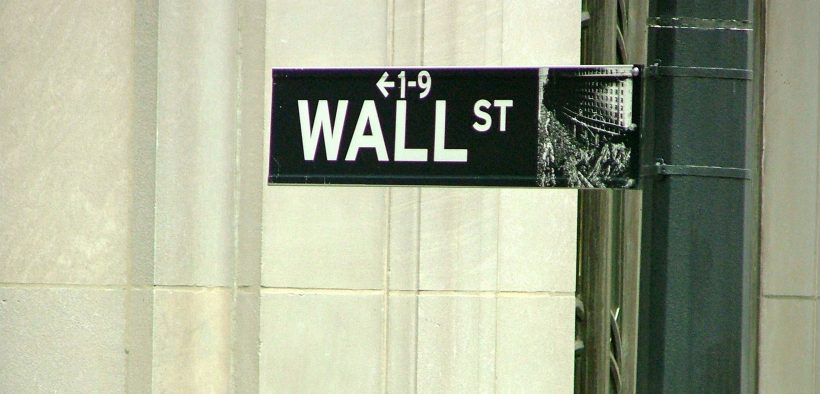Bill to Tax Wall Street Transactions Introduced By Sanders and Lee

“More than a decade after Wall Street greed brought the American economy to its knees, big banks are still using greed as a business model and are still engaging in the reckless behavior that helped cause our economy to crash in the first place.”
Presidential candidate Bernie Sanders and California Representative Barbara Lee introduced the “Inclusive Prosperity Act” on Wednesday, a bill that would impose fractional taxes on Wall Street transactions. Supporters of the bill say it could generate $2.4 trillion over the next decade, while discouraging high-frequency speculative trading that produces no real economic value but destabilizes financial markets.
Minute Taxes on Wall Street Transactions Would Help ‘Build an Economy That Works for All Americans’
Sanders first promoted a financial transactions tax during his 2016 presidential campaign. Analysts believe Sanders seeks to differentiate himself from centrist rival Joe Biden with legislation like the Inclusive Prosperity Act and the recently introduced “Loan Shark Prevention Act,” a bill to cap credit card interest at 15 percent that the Vermont senator cosponsored with Rep. Alexandria Ocasio-Cortez.
“While the top 23 banks in America received over $20 billion in tax breaks last year as a result of the Trump tax plan, hundreds of thousands of young people are unable to go to college because they can’t afford it, 34 million Americans have no health insurance, one out of five Americans can’t afford to buy the medicine prescribed by their doctors, over 40 million Americans are living in poverty, we have the highest childhood poverty rate in the developed world and life expectancy in the U.S. has gone down for the third year in a row. It is long past time for Congress to rein in the recklessness of Wall Street billionaires and build an economy that works for all Americans,” said Sanders.
The Inclusive Prosperity Act would tax stocks at 0.5%, bonds at 0.1%, and derivatives at 0.005%.
Senator and presidential candidate Kristen Gillibrand was among the dozen other Democratic lawmakers introducing the bill.
“More than a decade after Wall Street greed brought the American economy to its knees, big banks are still using greed as a business model and are still engaging in the reckless behavior that helped cause our economy to crash in the first place,” said Gillibrand.
Analysts Concerned Wall Street Headed to Potential Crisis
Gillibrand’s comments hold significance in light of the Trump administration’s roll backs of the Dodd-Frank financial regulation, which was imposed as a solution to the irresponsible speculative behavior that led to the 2008 financial crisis. Critics argue Dodd-Frank didn’t go nearly far enough, as analysts are concerned recent developments prove Wall Street has failed to learn the lessons of the last crisis.
As Financial Times columnist Rana Foroohar recently wrote, Wall Street’s newfound interest in mobile homes is a continuation of the dysfunctional housing sector incentives that led to the 2008 subprime mortgage crisis. Rent costs are rising sharply in mobile home parks that have been taken over by private equity firms, an example of how “financial markets provide incentives for asset bubbles,” a systemic flaw Foroohar believes could lead to another financial crisis.
Presidential hopeful Andrew Yang, who made it into CNN’s top 10 Democratic candidates (there are currently 24) for the first time Thursday, is another supporter of a financial transaction tax:
“Investing has been transformed into speculation by computer-generated algorithms and trading platforms. The average holding time of a stock is now only 4 months. There is no real value being generated, just individual firms trying to squeeze value out of the system, often at the expense of the public,” Yang’s website reads. Yang believes the risk produced by speculation is burdened by taxpayers, rather than those who cause it, continuing:
“In order to raise revenue while also stymying some of the rampant speculation that can lead to financial collapse, a financial transaction tax should be levied on financial trades. This has been adopted by other countries quite successfully.”
Critics of the proposal argue a financial transaction tax would reduce liquidity and hurt savers. Economist Dean Baker disagrees, saying it’s “hard to think of a better tax,” as he believes it would eliminate waste in the financial sector and that costs would be put on the financial industry rather than individual holders of stock or pension funds.
Sanders is frequently asked how he would pay for his bold progressive agenda, and proposals like the Inclusive Prosperity Act and an increased estate tax are his answer. Sanders says the Inclusive Prosperity Act would be used primarily to fund tuition-free college and cut student loan debt.









